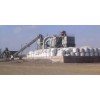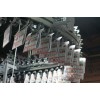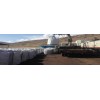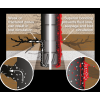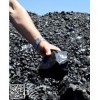A generic name widely used for a black, lustrous, carbonaceous resin classified as an asphaltite. An important characteristic of gilsonite is its softening-point temperature . In oil-base muds, it is used as a fluid-loss control agent. Being a hydrocarbon, it is naturally wetted by the oil. In water-base muds, it is used as a shale-stabilizing additive and is difficult to evaluate unless tested at or above its softening point. As a hydrocarbon, the powder must be coupled to water by using a glycol or similar water-wetter.The physical and chemical properties of Gilsonite :” strength, flexibility, bonding, high-temperature performance, environmental safety – make it an ideal additive for many critical applications. “.In addition, Gilsonite’s characteristics make it ideal as an ink and paint additive, asphalt binder, concrete expansion joints binder, and foundry sand additive In the Oil & Gas industry, it performs as a lost circulation material, enhancing zonal isolation and wellbore integrity, and improving wellbore stability.








